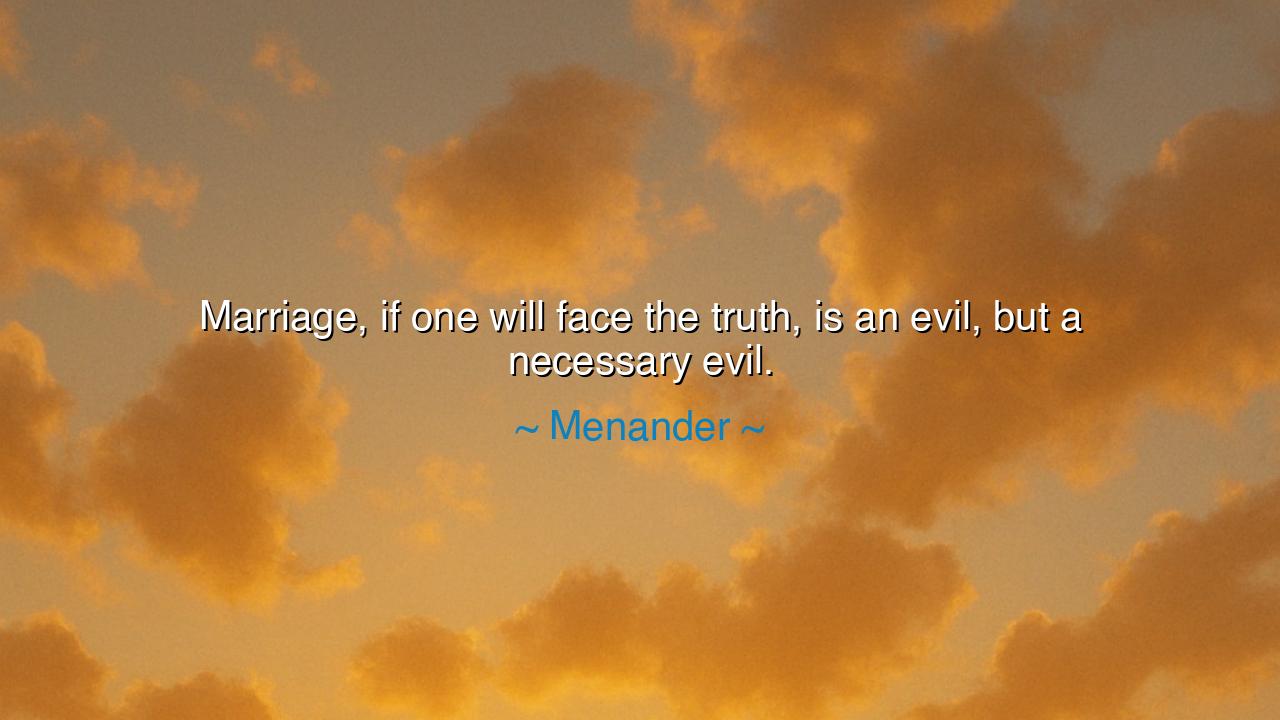
Marriage, if one will face the truth, is an evil, but a necessary






Hear, O listener, the words of Menander, the ancient Greek dramatist, who gazed upon the struggles of men and women and declared with biting honesty: “Marriage, if one will face the truth, is an evil, but a necessary evil.” These words, sharp as a blade, cut through the illusions of romance to reveal the burdens of duty, compromise, and sacrifice that lie hidden beneath the veil of love. Menander, living in the fourth century before Christ, was no stranger to the complexities of human relationships. Through comedy and satire, he exposed the frailty of human desires and the hardships of binding two wills into one.
To call marriage an evil is not to say it is wholly destructive, but that it carries within it struggle and pain. The ancients knew this well: when two souls unite, they do not bring only affection, but also their flaws, their tempers, their ambitions. Thus, conflict is inevitable. Menander, with the keen eye of a dramatist, saw that love may sweeten life, but marriage demands endurance. In it, freedom is curbed, desires are constrained, and self-will must bow. To those who prized independence, this binding felt like chains, and thus he named it an “evil.”
Yet he did not leave it there. He called it also a necessary evil, for though burdensome, it was the foundation of society. Without marriage, the household falters; without households, the city weakens; without the city, civilization itself collapses. Through marriage, children are nurtured, property is safeguarded, alliances are forged, and the generations continue. The Greeks, like all peoples, understood that even if the bond is heavy, it is the bond that holds the fabric of life together.
Consider the story of Pericles, the great Athenian statesman. His marriage was loveless and bitter, and he separated from his wife. Yet, even after, he recognized the necessity of such unions for the stability of the polis. The family was the smallest unit of the state, and without families, Athens would have no citizens, no soldiers, no legacy. Here we see Menander’s meaning: though personal happiness may falter within it, marriage as an institution remains essential for the survival of the whole.
In calling marriage both evil and necessary, Menander was not cursing it, but revealing the paradox at its heart. It is the crucible where joy and sorrow mingle, where love is tested by daily toil, and where the individual must sacrifice freedom for the sake of a greater order. What seems bitter in the moment—quarrels, obligations, compromises—often yields a sweetness that cannot be gained in solitude: companionship, children, legacy, and the weaving of one’s life into something larger than oneself.
O children of the future, learn this: do not enter marriage with illusions of endless bliss, for disillusion will crush you. Enter it instead with eyes open, knowing it is both burden and blessing. Accept its struggles as part of its necessity, and do not flee when hardship arises. For just as iron sharpens iron, the trials of marriage refine the soul, teaching patience, humility, and resilience. What seems an “evil” is often the soil in which virtues grow.
What, then, should you do? If you choose marriage, choose with wisdom, not with haste. Honor the covenant not only in passion, but in perseverance. When difficulties come, do not despise them, but see them as part of the necessity that binds families and societies together. And if you remain outside marriage, do not scorn it, for even if you do not bear its yoke, you live in a world sustained by those who do.
Thus, Menander’s words, though sharp, are not merely cynical. They remind us that life’s greatest institutions are often heavy with duty, but duty itself is the path to endurance and legacy. Marriage may be an evil, but it is a necessary one, for from it springs the continuation of the human story. Embrace it, endure it, and sanctify it, and you will find in its trials not only hardship, but wisdom, growth, and the weaving of lives into eternity.






AAdministratorAdministrator
Welcome, honored guests. Please leave a comment, we will respond soon